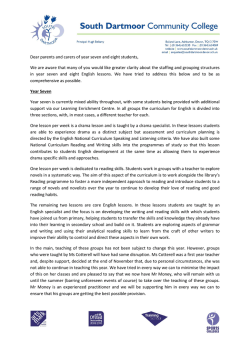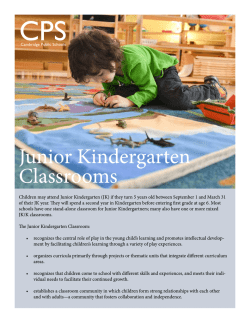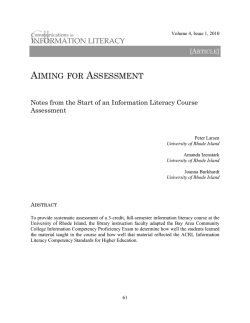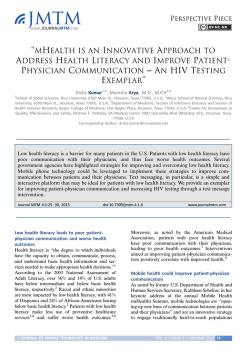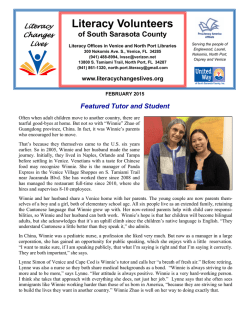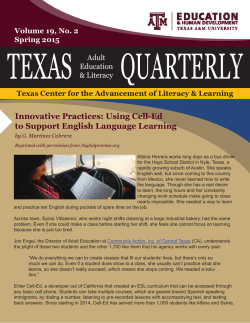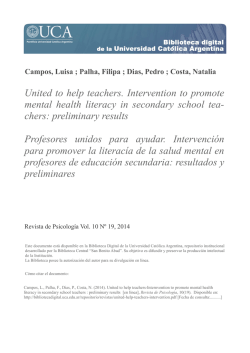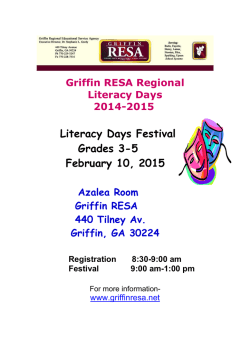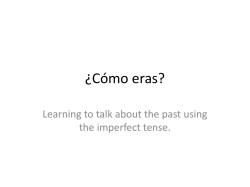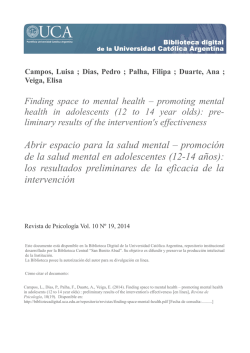
Guest Editorial - Navigating in the Digital Era: Digital Literacy: Socio
Eshet-Alkalai, Y., & Soffer, O. (2012). Guest Editorial - Navigating in the Digital Era: Digital Literacy: Socio-Cultural and Educational Aspects. Educational Technology & Society, 15 (2), 1–1. Guest Editorial - Navigating in the Digital Era: Digital Literacy: Socio-Cultural and Educational Aspects Yoram Eshet-Alkalai and Oren Soffer The Open University of Israel, Israel // [email protected] // [email protected] In recent years, digital technologies (social media, multimedia and communication technologies) have penetrated almost every aspect of our lives. They’ve become an essential element in learning, interpersonal communication, organizational work, and our leisure time. Extensive research has recently undertaken to assess how digital technologies—such as e-book readers, social media, mobile technologies and multi-player online games—are actually altering the traditional modes of learning, knowledge construction, cognitive and social skills, information distribution and consumption, as well as social participation and relationships. Ever-expanding and changing digital technologies confront users with the need to master a wide range of technological, cognitive and social competences—collectively termed "Digital Literacy." Users thus must become “digitally literate” in order to cope effectively with the complex sociological, cognitive and pedagogical challenges these technologies pose. These skills include, for example, the ability to operate computers and navigate the net effectively, to cope with large volumes of information, to evaluate the reliability of information, and to critically assess what seem to be natural (and not ideologically biased) technological tools. In a different way from the spirit of modern print, learners construct and consume knowledge in non-linear environments. They need to learn, collaborate and solve problems effectively in virtual (non face-to-face) learning environments, and to communicate effectively in technology-mediated social participation environments. It is important to note: digital literacy, then, is not limited simply to computer and Internet operation and orientation. It also relates to a variety of epistemological and ethical issues arise due to the unique characteristics of digital technologies and that are often overlapped with trends related to the post-modern and post-structural era. These include questions regarding the authority of knowledge, intellectual property and ownership, copyright, authenticity and plagiarism. Furthermore, issues such as self-representation, virtual group dynamics, and on-line addiction also arise. In this sense, digital literacy allows learners and users to navigate the changing socio-technological and philosophical-epistemological environments, where the conventions regarding preferred and prohibited learning methods are constantly challenged—both by social and philosophical trends and by communication and learning technologies. This special theme issue of the journal focuses on the various aspects of digital literacy. It explores the expression of digital literacy and digital literacy skills in fields such as learning, teaching, media affordances, and sociology. It does so by discussing the challenges and obstacles to digital literacy's optimal effective and efficient utilization of innovative technologies. The four articles in this special issue vary in their topics of study and research methods, ranging from an empirical quantitative study to theoretical papers. Rita Kop’s article relates to learning epistemology on the Internet, as well as to user- awareness of the non-natural nature of the technology of search engines. Kop stresses the restrictions and limitations that these engines impose on the users while browsing information through the net. According to Kop, this limited search environment—which is radically different from the popular image of a democratic and free Internet—stresses the need for human mediation of information in the learning process. The next two articles in the journal demonstrate behavioural research perceptions. Ina Blau and Azi Barak explore the variables that affect people’s participation and contribution in online group discussions. Among other things, the article compares participation rates and the characteristics of online textual or audio chats in different social contexts. The paper by Suzan Lema Gencer and Mustafa Koc deals with dysfunctional digital literacy. Their article examines Internet abuse among Turkish teenagers: drawing upon a wide and varied student sample, the study assesses the role of social and academic backgrounds in explaining such abuse. And finally, in the concluding article, Liat Eyal discusses the role of the teacher in the digital era, with a special focus on digital assessments. ISSN 1436-4522 (online) and 1176-3647 (print). © International Forum of Educational Technology & Society (IFETS). The authors and the forum jointly retain the copyright of the articles. Permission to make digital or hard copies of part or all of this work for personal or classroom use is granted without fee provided that copies are not made or distributed for profit or commercial advantage and that copies bear the full citation on the first page. Copyrights for components of this work owned by others than IFETS must be honoured. Abstracting with credit is permitted. To copy otherwise, to republish, to post on servers, or to redistribute to lists, requires prior specific permission and/or a fee. Request permissions from the editors at [email protected]. 1
© Copyright 2026

